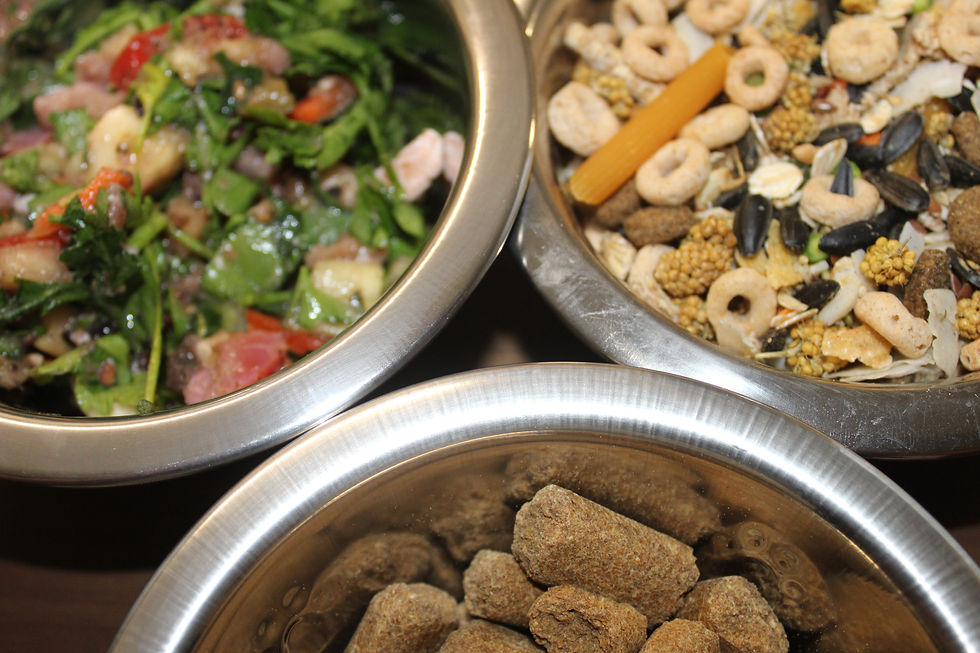Hazardous Fruits and Vegetables That Could Harm Your Pet Rats
- StormHaven Rattery

- Oct 1, 2025
- 3 min read

Rats are not just pets; they are intelligent and affectionate companions that thrive on interaction. As a responsible pet owner, delivering a balanced and safe diet is essential for their well-being. Many fruits and vegetables are healthy snacks, but some can pose serious risks. This post will highlight the specific fruits and vegetables that could harm your pet rats, keeping them safe and happy.
Understanding Rat Nutrition
Before we look at harmful foods, it’s important to grasp what a healthy diet for rats entails. As omnivores, rats enjoy a diverse diet that includes grains, fruits, vegetables, and proteins. A nutritious diet typically comprises:
High-quality rat pellets: These are specially formulated to meet your rats' nutritional needs.
Fresh fruits and vegetables: Providing essential vitamins and minerals.
Occasional protein sources: Cooked eggs or lean meats can be included for variety.
While many foods are beneficial, some can be toxic. Awareness is key to keeping your rat healthy.
Fruits to Avoid
1. Citrus Fruits
Citrus fruits like oranges, lemons, limes, and grapefruits are well-known for their high acidity. Although they are rich in vitamin C, they can upset your rat's stomach, leading to irritation and discomfort. One study showed that nearly 30% of pet rats experienced digestive upset after consuming citrus.
2. Avocado
Avocado is a beloved fruit but contains persin, which can be harmful to rats. Ingestion, even in small amounts, may cause respiratory issues or fluid buildup around the heart. Research indicates that around 40% of pets exposed to persin showed adverse reactions, making it best to avoid feeding avocado entirely to your rats.
3. Rhubarb
Rhubarb leaves are particularly dangerous; they contain oxalic acid, which is toxic to rats. Poisoning symptoms can include difficulty breathing and tremors, and even a small amount can be fatal. For your rats' safety, ensure rhubarb is never accessible to them.
4. Dried Fruits
While fresh fruits can be healthy, dried fruits often contain added sugars and preservatives. These concentrated sugars can contribute to obesity and tooth problems. For example, a rat that consumes a high-sugar diet may face a 40% increased risk of dental issues over time. Fresh options are the safer choice.
5. Grapes and Raisins
Both grapes and raisins have been linked to kidney failure in some animals, including rats. Not all rats react negatively, but avoiding these fruits is the safest option. Statistics show that even a small handful of grapes may be enough to cause serious issues in susceptible rats.
Vegetables to Avoid
1. Onions
Onions might be a common culinary ingredient, but they are toxic to rats. They contain compounds that can destroy red blood cells, leading to anemia. Even minor exposure can be harmful. Pet owners should keep all onions out of their rat's reach.
2. Garlic
Similar to onions, garlic can lead to gastrointestinal upset and anemia. Despite some opinions touting health benefits, it is best to keep garlic away from your rats, as just a small clove can have detrimental effects.
3. Potatoes
Raw potatoes, especially the green parts, harbor solanine, which is toxic. Symptoms may include severe digestive distress. Cooked potatoes are safer but should only be served sparingly. To minimize risk, make them an occasional treat rather than a staple.
4. Mushrooms
Certain mushrooms can be toxic, leading to serious health issues. With many mushroom varieties available, identifying which is safe can be tricky, so it’s best to avoid them entirely to err on the side of caution.
5. Spinach
Spinach may be a superfood for humans but contains oxalic acid, which can hinder calcium absorption in rats. Small amounts may not pose a danger, but it's wise to limit spinach in their diet to avoid complications.
Safe Alternatives
While there are many fruits and vegetables to avoid, there are plenty of healthy options for your rat's diet. Here are some safe choices:
Fruits: Apples (without seeds), bananas, blueberries, strawberries, and pears offer a tasty and nutritious snack.
Vegetables: Include carrots, bell peppers, broccoli, zucchini, and cucumber, which provide essential nutrients without harmful risks.
These alternatives can enhance your rat's diet and provide necessary vitamins, making them both happy and healthy.
Safeguarding Your Pets
As a caring rat owner, it is vital to recognize which fruits and vegetables could endanger your pets. By diligently avoiding risky options like citrus fruits, avocado, onions, and garlic, your pet rats can lead healthier lives. When unsure about any food item, always consult a veterinarian. A diverse diet that includes safe fruits and vegetables will keep them in top form.
By taking the time to understand your rats' dietary needs, you create a safe and nurturing environment for them, allowing them to thrive and enjoy life to the fullest.



Comments